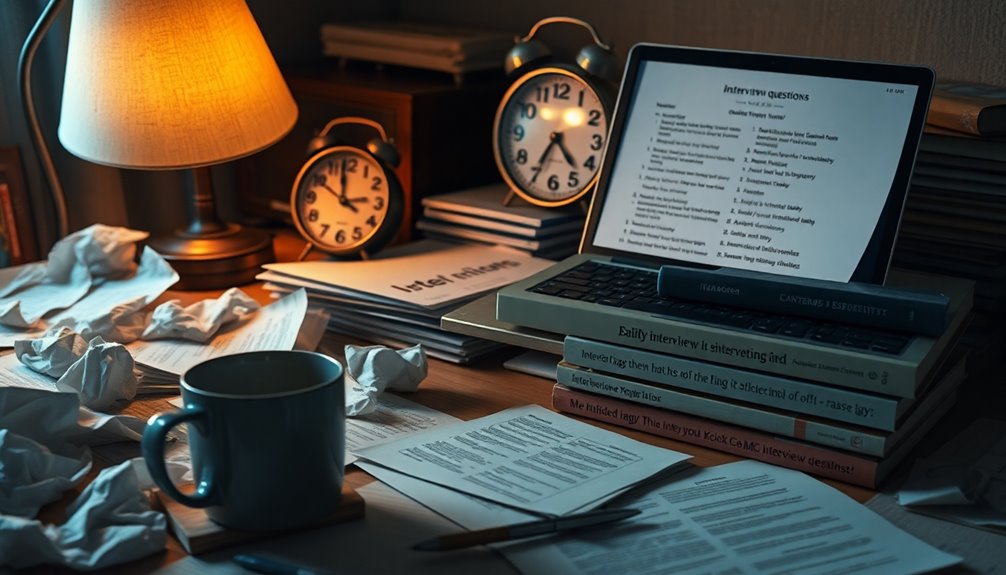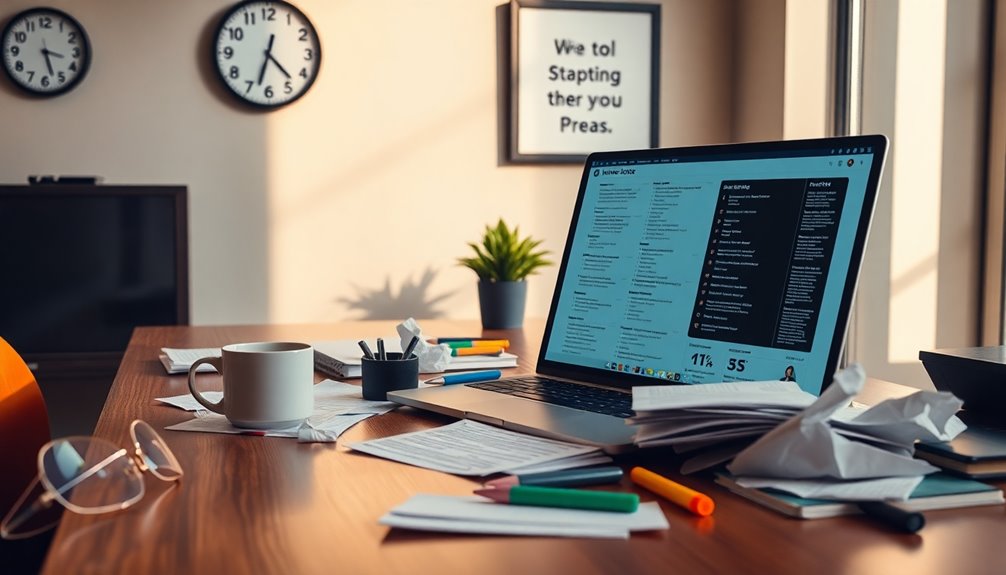The shocking prep myth that's wasting your time is overpreparation. When you cram information and rehearse responses, you risk sounding mechanical and losing authenticity. Instead of engaging in genuine conversation, you might rely on memorized answers, making it hard to connect with your interviewer. This rigidity can backfire, as interviewers appreciate spontaneity and honesty. It's essential to balance preparation with your unique qualities and storytelling. Remember, interviews are about fit and connection, not just qualifications. Stick around to uncover strategies that help you shine without sacrificing your authentic self.
Key Takeaways
- Over-rehearsing responses can lead to rigidity, making it difficult to adapt during interviews.
- Authenticity is more impactful than memorizing answers; genuine responses build trust with interviewers.
- Focusing solely on qualifications neglects the importance of cultural fit in the hiring process.
- Interviews are mutual evaluations; overly prepared candidates may miss opportunities to connect.
- Instead of memorizing, practice conversationally to foster spontaneity and improve engagement.
Understanding the Overpreparation Myth

Overpreparing for an interview might seem like a smart strategy, but it can actually backfire. When you over-rehearse, your responses can become so rigid that you struggle to think flexibly. If your mind goes blank during a question, panic can set in, making it tough to recover.
Even simple prompts like "Tell me about yourself" can trip you up if you're too focused on a memorized answer. This anxiety often shows, negatively impacting your performance. Additionally, you might find yourself skewing questions to fit your rehearsed responses, leading to irrelevant answers. Imagine being asked about teamwork and responding with your leadership skills instead. This lack of adaptability makes you seem inflexible, which is a red flag for interviewers. Over-preparation can diminish your ability to engage with the interviewer and respond appropriately.
Your overpreparedness can also prevent you from demonstrating your ability to think on your feet. Interviewers value candidates who can understand and address specific situations rather than those who sound robotic. Moreover, being too rehearsed can hinder your chances of showing emotional intelligence, which is a key trait that interviewers look for in candidates.
Ultimately, if you prioritize memorization over spontaneity, you risk appearing uptight and less personable—traits that could cost you the job. Balancing preparation and authenticity is key to a successful interview.
Importance of Authenticity

While it's important to prepare for interviews, striking the right balance with authenticity can make all the difference. When you present your true self, you immediately build trust and credibility with interviewers. They can often sense insincerity, so being transparent about your strengths and areas for improvement is essential. Employers appreciate honesty regarding your skills and experiences, as it sets the foundation for a successful working relationship.
In a competitive job market, authenticity helps you stand out. Your unique qualities and perspectives can differentiate you from other candidates and make you memorable. Embracing your individuality means you don't have to conform to an unrealistic standard of perfection. Additionally, authentic candidates often build immediate trust with hiring managers, enhancing the likelihood of a positive outcome.
Additionally, aligning with a company's values and culture is vital. Engaging in discussions about value alignment can help you determine whether a job is the right fit, and employers genuinely value candidates who seek opportunities that resonate with their authentic selves.
Finally, genuine self-awareness fosters a deeper connection with interviewers. Sharing real-life examples and being candid about your limitations can showcase your personality and skills, creating a more meaningful exchange during the interview.
Effects on Interview Performance

The effects of interview preparation on your performance can be significant. While preparing thoroughly can boost your confidence, overpreparation often leads to flat, one-dimensional answers. If you memorize responses to common questions, your answers may come across as unnatural and lacking authenticity. This robotic delivery can hinder your ability to connect genuinely with the interviewer.
When you focus too much on rehearsed answers, you risk losing the opportunity to build rapport. Interviewers value candidates who engage in authentic conversation, and if you appear rehearsed, you might miss out on showcasing your personality and enthusiasm. Instead of engaging in a dynamic dialogue, you might find yourself delivering a scripted performance. Additionally, remember that cultural fit is an important aspect that interviewers consider, which can be better highlighted through genuine interactions.
Moreover, excessive preparation can limit your adaptability during the interview. With an unprepared interviewer, you may have a chance to steer the conversation favorably. If you can pivot away from memorized scripts, demonstrating your flexibility and communication skills, you stand a better chance of making a positive impression.
Balance your preparation by reviewing your experiences and crafting relevant anecdotes, ensuring you stay both prepared and authentic.
Debunking Common Misconceptions

Misconceptions about interviews can cloud your preparation and lead to unnecessary anxiety. Many people assume interviewers are fully prepared and know every detail of your resume, but that's often not the case. In reality, they might glance at your resume for the first time during your interview. Understanding these myths can help you gain confidence and recognize that relationship dynamics can mirror the complexities of the interview process.
| Misconception | Reality |
|---|---|
| Interviewers know everything about you | They may just skim your resume during the interview. |
| Qualifications guarantee a job | Fit with company culture and chemistry matter too. |
| There's a single right answer to questions | The approach to your answer often holds more weight. |
| Interviews are just tests | They're conversations where both sides evaluate fit. |
Recognizing these misconceptions allows you to control the dialogue and show your personality. Remember, interviews are mutual evaluations. Prepare to ask questions and assess if the company aligns with your values as well. By reframing your perspective, you can reduce anxiety and present your best self. Additionally, understanding that interviewers may not be fully prepared can help you feel more at ease and ready to take the lead in the conversation.
Strategies for Effective Preparation

Effective preparation is key to acing your interview and boosting your confidence. To maximize your chances of success, focus on these strategies:
- Pre-Interview Research: Understand the company's mission, values, and culture. Familiarize yourself with the job description and the interviewer's background. This knowledge allows you to tailor your responses and demonstrate genuine interest. Additionally, being well-informed can help you anticipate interview questions that may arise during the discussion.
- Practice and Rehearsal: Answer common interview questions in a conversational tone. Use the STAR method for behavioral questions and practice your body language. Conduct mock interviews to build comfort and confidence, keeping your responses concise and focused.
- Technical and Logistical Preparation: If it's a video interview, test your technology beforehand to avoid any hiccups. Know the software you'll be using, and plan your journey if it's an in-person meeting. Dress professionally, even for virtual interviews, to get into the right mindset.
Frequently Asked Questions
How Can I Tell if I'm Overprepared for an Interview?
You can tell you're overprepared for an interview if your answers sound too rehearsed or you're using words that don't fit your usual conversation style.
If you find yourself struggling to adapt when the interviewer asks something unexpected, that's a red flag.
Additionally, if your personality seems to vanish and your responses feel stiff, it's likely you've practiced too much.
Aim for a balance; keep it natural and flexible to showcase your true self.
What Should I Do if I Forget My Prepared Answers?
If you find yourself in a bind and forget your prepared answers, don’t panic—it happens to the best of us! Just take a deep breath and try to recall any key points or relevant examples that you can use to help answer the question. If you’ve already done your due diligence and followed the ultimate prep checklist before the interview, you should have a solid foundation of knowledge to rely on. But even if you haven’t, it’s important to stay calm and think on your feet. Remember, the interviewer is looking for more than just a perfect answer; they want to see how you handle pressure and think under unexpected circumstances.
Take a deep breath and ask the interviewer to repeat the question. This gives you a moment to regroup.
Use connecting phrases to steer your response back on track, focusing on relevant information you can recall.
How Can I Improve My Spontaneous Thinking Skills?
To improve your spontaneous thinking skills, embrace structures like "What, So What, Now What" to organize your thoughts quickly.
Practice managing anxiety by adopting a service-oriented mindset, viewing speaking as a chance to connect with your audience.
Join groups like Toastmasters for real-time practice and engage in activities that enhance present-moment awareness.
Ultimately, welcome unexpected situations as opportunities for creative problem-solving, and focus on clear, concise communication to build your confidence.
What Role Does Body Language Play in Interviews?
Body language plays an essential role in interviews. It communicates your confidence and engagement to the interviewer. A firm handshake, eye contact, and a genuine smile help create a positive first impression.
When you mirror the interviewer's body language, you build rapport. Sitting up straight and maintaining an open posture signals professionalism.
How Can I Handle Unexpected Questions During an Interview?
When unexpected questions pop up, take a deep breath, gather your thoughts, and pause. You've got this!
Clarify if needed, ensuring you understand what's being asked. Stay calm and composed, showing your ability to handle pressure.
Focus your response on relevant experiences, tying them back to the role. If you don't know the answer, be honest.
A thoughtful pause can turn an unexpected moment into an opportunity to shine!
Conclusion
In the grand play of interviews, don't let the myth of overpreparation steal your spotlight. Embrace your authentic self, like Shakespeare's characters who thrived on genuine emotion rather than rehearsed lines. Remember, it's not about memorizing answers but engaging in a real conversation. By shedding the weight of excessive prep, you can shine brighter and connect more deeply. So, step into the room as you are, and let your true self make the lasting impression.









